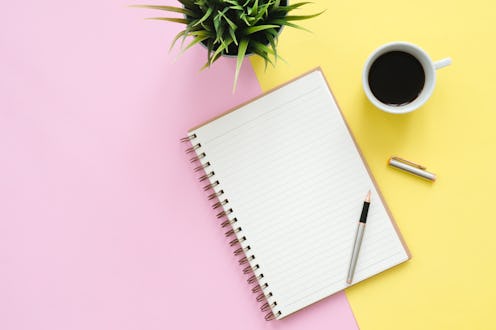Self
What Starting A New Notepad Or Diary Does To Your Brain
"A blank page and the feeling of a fresh start is great for the mind," a health expert tells Bustle.

A new year means a blank slate, and what better way to signify that than cracking open a new planner or journal. Whether your aim for 2021 is to be more organised or to connect with your mind, putting pen to paper can be an integral step into shaping the year ahead. But what happens to your brain when you start a new notepad or diary?
According to a brain imaging study conducted by UCLA psychologists in 2007, writing down thoughts and emotions reduces activity in the emotional centre of the brain (the amygdala), lowering the intensity of feelings like anxiety, anger, and sadness. Writing longhand also helps the brain process emotion, with a 2017 study published in Frontiers for Psychology suggesting that writing and drawing "activate larger networks in the brain [...] resulting in neural activity that governs all higher levels of cognitive processing and learning." Basically, writing in a notepad or diary helps your brain to process information more efficiently — especially thoughts and feelings.
"A blank page and the feeling of a fresh start is great for the mind," Dr Sumera Shahaney, a medical doctor and Head of Clinical Operations at health tracking app Thriva tells Bustle. "As a starting point, it helps you draw a line under things that have happened before, and makes you feel in control of a new destiny and path."
Processing emotions
Whether you write consistently or sporadically, a new notepad or diary "helps you develop order and connect with inner thoughts in a safe environment so you can work out what really matters," Shahaney explains. Even just listing seemingly trivial things that occur throughout your day can be extremely beneficial.
Jotting down these observations also "allows you to vent and process the many thoughts swirling in your head that eventually leads you to a greater understanding" of yourself, Dr Sanam Hafeez, psychologist and founder and director of Comprehensive Consultation Psychological Services, says. This enables you to release "the pent up emotions that [can] cause anxiety, depression, anger, and distress."
Getting organised
Multitasking can be beneficial for some, but according to Shahaney research suggests that if you have too much going on in your brain, each task "has to compete for neural representation as it is overstimulated." Basically, the more things you try to balance, the less your brain can focus. So planning and prioritising your most important tasks is a must, and "having a new diary or planner and getting organised will clearly help on this front," Shahaney says. Organisation and planning provide structure, and structure helps you feel more productive.
For those who experience mental illnesses like ADHD and anxiety, Hafeez highlights that "planners, online or email calendars, reminders or task apps, can make a huge difference. It can act as a place of accountability and keep you anchored during the day when we can drift off."
Tracking your physical and mental health
Journaling can take many forms, and according to Shahaney, "there's growing evidence that it can improve both physical and psychological health" by prompting your brain to "prioritise concerns, identify negative thoughts, and learn triggers" which can provide "an opportunity for self-reflection."
And if you're concerned with your physical health, you can use journaling or digital health journals to track any irregularities, Shahaney says. However, she stresses that "processing thoughts and planning in this way is just one element of a healthy lifestyle." You should "also consider working on achieving a balanced diet, exercising regularly, getting a good night sleep, and avoiding alcohol and drugs" to improve your mental and physical health.
Hafeez adds that journaling is shown to "clinically boost happiness", and can also be used as an "effective tool in cognitive behavioural therapy (CBT)" — a form of talking therapy designed to change the way you think and behave, per the NHS. However, "writing in a diary does not negate or replace the need for intervention by a mental health professional." Although, Hafeez does highlight that journaling "is a wonderful adjunct to treatment" that is readily available "a most of all, effective."
Ticking off to-do lists
"If you love being organised, finding all your tasks in one place and crossing them off" can most definitely "help you feel more efficient and productive, but also less anxious," Hafeez says. On a practical level, Shahaney agrees. "A new notebook or planner can help streamline to-do lists and gives you a chance to prioritise" the tasks that you need to complete within a certain timeframe. However, there's always the possibility that you'll find yourself "forever racing through a never-ending list," leading to a cycle of stress and anxiety.
To combat this, Shahaney recommends sticking to writing down three of the most important tasks that you need to complete at one given time, rather than twenty or so mundane tasks that may clog up your to-do list. They also suggest that if you're prone to creating extensively long lists, you should "check which items have been on your list for a long time and ask yourself why" they're there, and how it would affect your productivity if you ignored them.
Experts:
Dr Sumera Shahaney, Head of Clinical Operations at Thriva
Dr Sanam Hafeez, Psy.D.
Studies cited:
University of California — Los Angeles. "Putting Feelings Into Words Produces Therapeutic Effects In The Brain." ScienceDaily. ScienceDaily, 22 June 2007. <www.sciencedaily.com/releases/2007/06/070622090727.htm>
Van der Meer A. L. H., Van der Weel F. R. (2017). Only three fingers write, but the whole brain works: a high-density EEG study showing advantages of drawing over typing for learning. Front Psychol. 8:706. 10.3389/fpsyg.2017.00706.